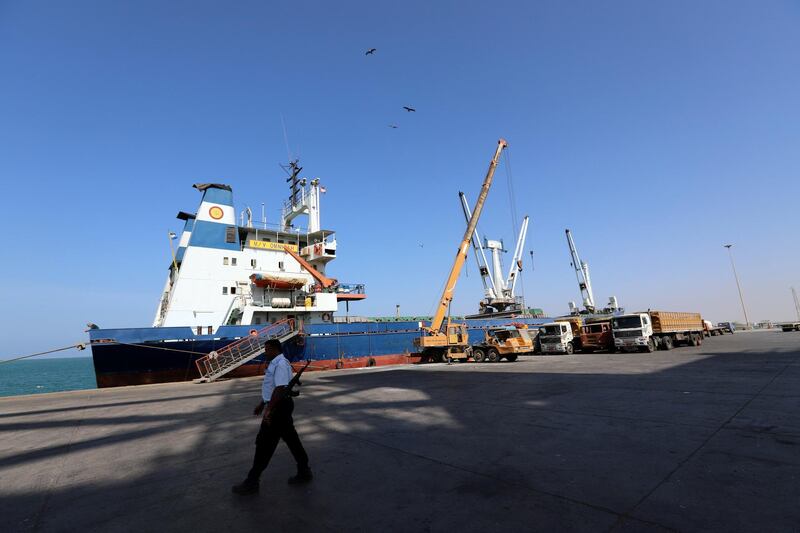Yemen's Houthi rebels could start withdrawing from Hodeidah within the next few days, British Foreign Minister Jeremy Hunt said on Thursday, raising hopes that a long-delayed ceasefire around the vital port city will be implemented.
"The basic situation is that it's possible that Hodeidah could finally be cleared of Houthi troops in the next few days, and that will be an important step forward in the implementation of the Stockholm agreement," Mr Hunt said after chairing talks on Yemen between the UK, US, Saudi Arabia and the UAE.
The Hodeidah ceasefire, which calls for the withdrawal of all forces from the city and its ports, was agreed at UN-led talks between the government and rebels in Sweden in December.
"However if it that doesn't happen there is real frustration and impatience that it is taking so long. So this is really a crunch moment in the Yemen process," Mr Hunt said in a video posted on Twitter a day after the meeting in Warsaw.
My update on Yemen after talks with partners in Warsaw yesterday evening pic.twitter.com/tUQaL5iIxJ
— Jeremy Hunt (@Jeremy_Hunt) February 14, 2019
Mr Hunt's comments came as the Saudi-led coalition supporting the government, which includes the UAE, signalled that it was losing patience after hundreds of rebel violations of the truce and the delay in implementing its terms.
A statement released on the UAE state news agency Wam noted that the coalition and government forces had exercised restraint despite more than 1,400 violations since the ceasefire went into effect on December 18.
The statement said all signs indicated that the Iran-backed rebels were "intentionally hindering the implementation to gain time to build their military capabilities" in Hodeidah city and province.
The ceasefire is considered essential to ensuring the continued operation of Hodeidah's ports, which receive the bulk of Yemen's food and humanitarian aid shipments. It is also seen as a first step to ending four years of war that the UN says has left about 24 million people – four-fifths of the population – in need of aid. Two-thirds of all districts in the country are in the pre-famine stage, according to the UN's latest humanitarian report.
The UN Security Council is expected to convene on Monday to review progress on the ceasefire. The head of the UN monitoring mission in Hodeidah, Danish General Michael Lollesgaard, warned the rebels on Wednesday that the council would exert political pressure if they did not comply with the deal.
"The international community's attention will be directed towards Hodeidah until the agreement is fully implemented," a Yemeni government source told The National.
The Houthis heavily bombarded government-held positions in Al Duraihimi district south of Hodeidah city on Wednesday in an escalation of their truce violations, a spokesman for the pro-government Amalikah Brigades said.
"The Houthis pounded sites controlled by the joint forces using tanks and heavy artillery in addition to mortar and howitzer shells," Aseel Al Sakladi told The National. "They have committed hundreds of violations since the ceasefire declaration but such intensive shelling is a new development."
He said the government forces suffered no casualties and did not retaliate.
Meanwhile, four civilians were killed on Wednesday by rebel mines in the far south of Hodeidah province, according to a resident of the area.
A man and two women died when their motorcycle hit a mine on a road in Al Thunien village, north-east of Haiys city, Faisal Durami told The National.
“People rushed to help them but they died before they reached the hospital in Khokha," Mr Durami said.
He said another man was killed and his passenger seriously wounded when their car hit a mine while travelling to a market in Hawiya village in southern Haiys district.
The district has not been fully liberated from the Houthis and the rebels still control positions to the north and the north-east of Haiys, with fighters stationed in the mountains around the city, Mr Duraimi said.
“The Houthi fighters come on to the roads at night and plant mines which have claimed dozens of lives," he said.
Separately, three soldiers were killed in the southern province of Abyan on Wednesday afternoon by a mine believed to have been planted by Al Qaeda, a security source said.
“A military vehicle from the Security Belt Forces passed over an explosive device suspected to be planted by elements from Al Qaeda, killing three soldiers and injuring two others," the source said.
The Security Belt Forces backed by the UAE have carried out several offensives against Al Qaeda pockets in Abyan, including in Al Mahfed district where the mine blast occurred and in Mudiya in the east of the province.






